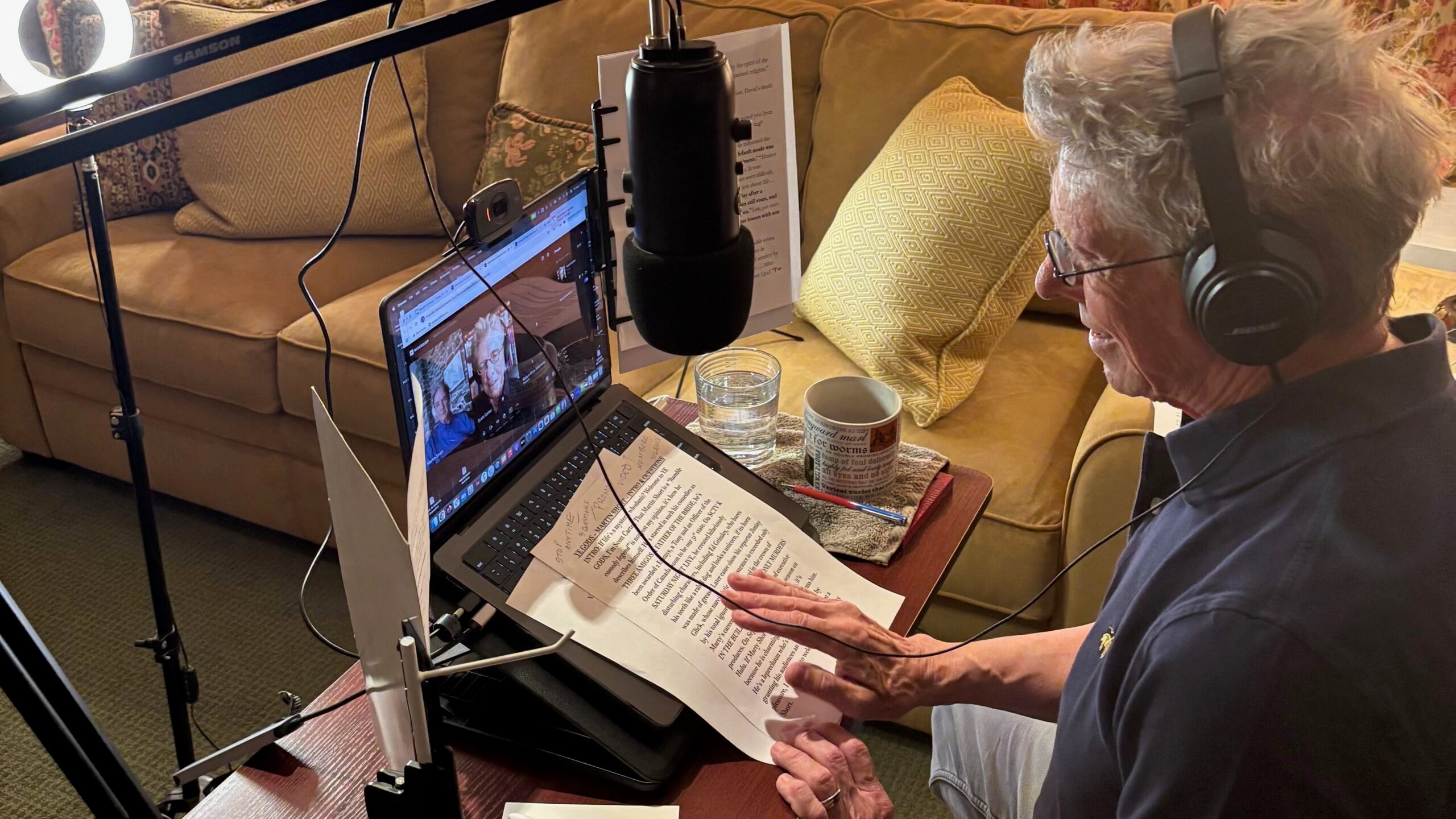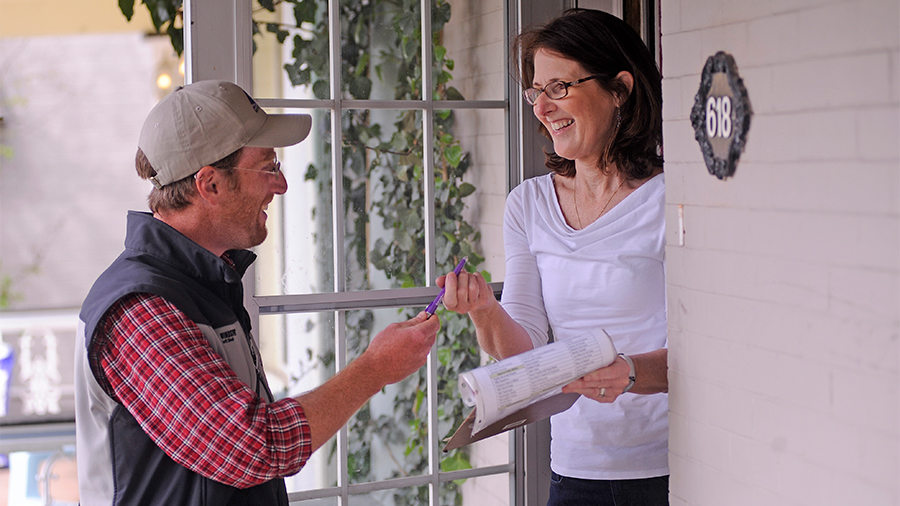‘Ye Gods’ show invites celebrities to discuss the rules that guide their lives

Efficiency Studios
"Ye Gods" host Scott Carter records an interview with Martin Short.
Scott Carter has built a career making sense of the uncertain. As a TV producer, he’s spent countless hours preparing guests for Bill Maher’s talk shows, often unsure of the direction each episode would take.
“It’s like I was getting elements ready for a scientific experiment,” Carter said. “I never knew exactly what was going to be happening, but almost always it was going to be interesting. And entertaining. And provocative.”
Now, Carter is bringing his fascination with life’s uncertainties — and the ways that spirituality and religion guide people in navigating them — to public media. The interview-based show features entertainers and religious leaders who can engage in lively discussions about big philosophical questions. And this time, Carter is hosting the conversations.
Ye Gods With Scott Carter, his new public radio show and podcast, explores how people find meaning and purpose in their lives. Carter partnered with WGCU in Fort Myers, Fla., to launch the podcast through the NPR Network in August. Over a three-year run, which includes broadcast distribution via PRX and Content Depot, the show will deliver 120 episodes. Each will explore the belief systems and codes of conduct of comedians, actors and religious leaders, many of whom Carter knows from his television career.
Carter estimated he’s met as many as 6,000 guests from the TV shows he’s produced. “Very often, I’ll see somebody on TV and think, ‘Oh! I forgot about so and so, let me call him!’ or “Let me email!’ … Marty Short — I hadn’t talked to in years, and I emailed him. Three minutes later, he emails back and says, ‘Anything for you. I’d love to!’” The actor and comedian appeared on the premiere episode of Ye Gods.
WGCU GM Corey Lewis, who greenlit a pitch to adapt Carter’s show idea for public radio, says Ye Gods encapsulates WGCU’s goal to help listeners relate to one another.
“It fits squarely with what I think is a priority for us here locally and in the country, which is helping people get through these crossroads in their life from any number of approaches and different religions and cultures and races,” Lewis said.
Religion with ‘Hollywood glamor’
Ye Gods is not Carter’s first public media production. He was co-creator and EP on Love & Respect with Killer Mike, a 2021 interview series hosted by rapper and activist Michael Santiago Render. Through that TV show, produced by WABE in Atlanta and distributed nationally by PBS, Carter met Selena Lauterer of Artemis Independent, who managed station relations for the national release.
At that time, Carter was developing his ideas for Ye Gods and shared early episodes with Lauterer. “I kept going, ‘This is really a public radio show. This is perfect for public radio!’” she recalled. “It’s kind of like On Being with Krista Tippett, but it’s got a little bit more of that Hollywood glamor entertainment piece to it as well.” Lauterer introduced Carter to Amy Shumaker, WGCU’s associate GM of content, who believed in his idea and set up a meeting with Lewis.
“I told him this was a hit waiting for a platform,” Lewis recalled. “If we could NPR-ize a new project, then we could get it … in the public media ecosystem and with the audience that comes to us.”
Carter had previously launched a limited run of Ye Gods independently through his company, Efficiency Studios. Dossie McCraw, the entertainment programming and development executive, worked with Carter to develop the show. McCraw, a co-creator and EP of Ye Gods, is also an EP on the podcast History That Doesn’t Suck with Professor Greg Jackson.
Shumaker, an Emmy and Peabody-winning producer who previously led national productions for South Carolina ETV, is also an EP on Ye Gods. As co-EP, Lauterer manages series promotion for broadcast.
Origins and influences
Carter has had a complex relationship with religion his whole life. After he was diagnosed with asthma at age two, his family relocated to Tucson, Ariz., so he “would survive childhood.” His mother would take him to religious ceremonies that promised to cure his asthma if he “just believed enough,” he recalled.
“I’m a seven-year, eight-year-old child … and this ancient minister is laying his hands on me and invoking God to heal me — and nothing is happening,” Carter said. “Over time, I begin to think that either there is no God, or Jesus … comes into my room while I’m sleeping and chokes me so that I wake up wheezing.”
Carter carried his disillusionment with religion into midlife. Then a severe asthma attack nearly took his life at 35, leaving him hospitalized for a week. After recovering, Carter realized he had been taking life for granted. To avoid reverting to his earlier “sleepwalking existence,” Carter decided to replace his religious resentment with intrigue.
“I made this deal with the universe,” Carter said. “If anybody wants to talk to me about religion, instead of mocking them, I would just have to listen.”
At the time, Carter was doing stand-up comic sets in New York City. He began incorporating his near-death experience into his comedy routine. Eventually, his comedy work helped land his first job writing for television.
As Carter’s career advanced, his fascination with religion only intensified. After discovering classic texts explaining the Bible’s New Testament, including Thomas Jefferson’s Jefferson Bible, Charles Dickens’ The Life of Our Lord and Leo Tolstoy’s The Gospel in Brief, Carter developed a play in which the authors debate each other about their interpretations.
Carter was intrigued by how each author’s views on the Gospel aligned with the values reflected in their lives and their work. “Jefferson did not believe in miracles. He thought that they were an affront to science,” Carter said. “Dickens … loved the miracles.”
These contrasting philosophies inspired Carter’s play, The Gospel According to Thomas Jefferson, Charles Dickens and Count Leo Tolstoy: Discord. Since 2014, it has been staged in 26 cities in four countries. After performances, Carter held talkbacks with comedians, actors or writers who joined him on stage to discuss their theological beliefs and respond to questions and comments from the audience.
“I would say, ‘All right, in five minutes or less, was there any religion in your house when you were growing up? And, spiritually, where are you now?’” Carter said. “By the time that both of us finished, half of the people in the audience … wanted to start sharing.”
“So that was really the genesis of this podcast, exploring what people’s rules are,” he said.
Carter credits McCraw for suggesting that he could adapt his talkbacks into a podcast.
“I said … ‘I will put time into calling up people and getting them to do conversations with me,’” Carter recalled. “I know a lot of people who trust me enough.”
Carter produced 35 original episodes of Ye Gods for the limited run that was released in early 2023. Some of these interviews will be adapted and refreshed for the public radio launch.
“It’s mostly going to be either new, or I’m going to reframe it in some way to refresh it,” Carter said. “We’re not just going to retread our old shows.”
Moving forward
WGCU and Efficiency Studios are enhancing the audio quality for the show and editing each episode to conform to public radio’s standard clock.
Ye Gods is available for free radio broadcast through PRX and Content Depot, while the NPR Network manages podcast distribution. New episodes have a five-day exclusive broadcast release on Fridays. WGCU and USA Today used a similar model for their true crime show, The Last Ride, Lewis said.
As a free program offer, Ye Gods gives stations some flexibility as they evaluate how to adjust their program spending for the loss of their CPB grants, Shumaker said. “People putting together a schedule with less funding are going to be looking for excellent programming,” she added. “I think we fall into that high-quality programming that listeners of NPR stations … are looking for.”
LAist is among the stations that have picked up the show, Lewis said. “We’re trying to make sure that everybody gets a chance to hear this on either their local radio stations or their favorite downloads.”
Lewis believes Ye Gods can amass “four million downloads a year — or 100,000 downloads an episode,” which he described as his standard for success. Carter’s unique editorial framing stands out in today’s saturated podcast market, he added.
“There are shows on religion and spirituality, and there are celebrity interview shows, but there’s one that does both,” Lewis said. “This show helps people make sense of their lives with notable people that they’ve heard of.”
Carter is already thinking about how Ye Gods can help stations connect with their listeners. He hopes to partner with them to stage live iterations of his show for in-person audiences. In the meantime, he’s excited to introduce himself to NPR’s listeners.
“There are a high percentage of listeners of NPR that are seekers,” Carter said. “They’re people who are willing to try new things in life. I think that this show is going to be well-received by those people.”






